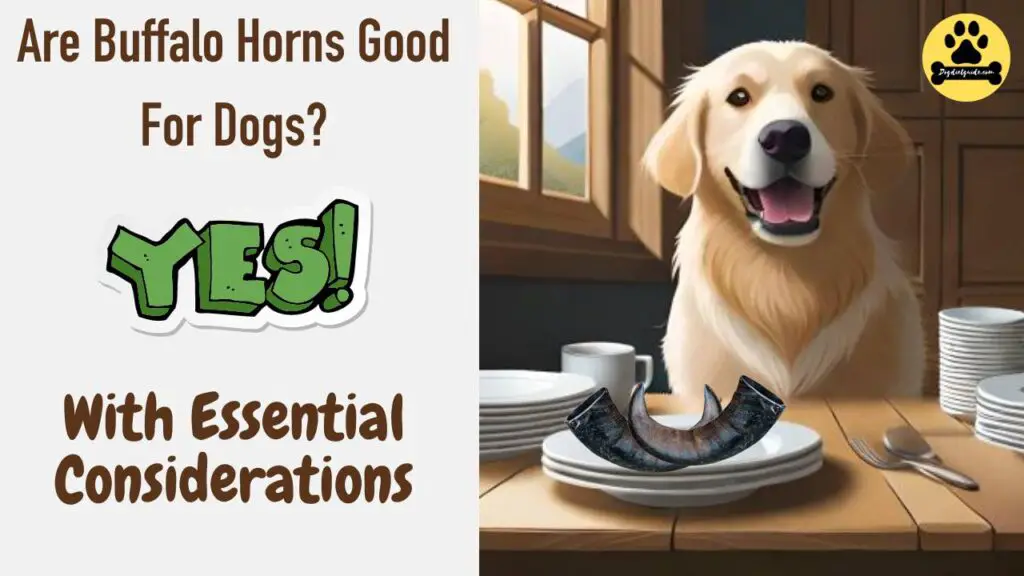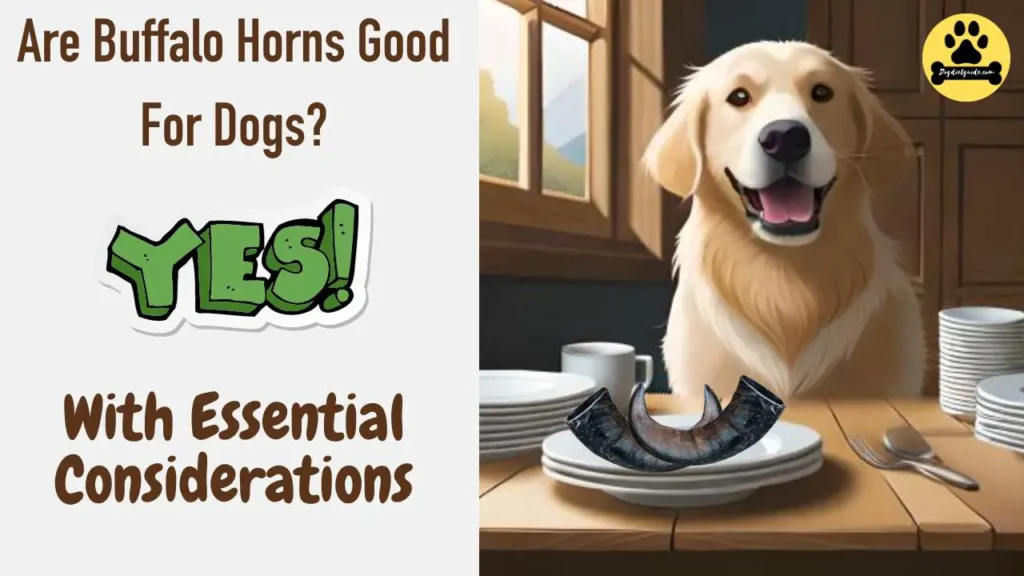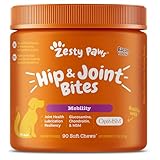As devoted pet owners, we always look for safe and enjoyable chew options for our furry friends. An increasingly intriguing option that has garnered attention in recent years is the utilization of buffalo horns. But are buffalo horns good for dogs?
Buffalo Horns For Dogs Overview
| Aspect | Pros | Cons |
|---|---|---|
| Dental Health | Helps clean teeth and reduce plaque buildup. | Can cause dental fractures or damage if chewed aggressively. |
| Long-lasting | Durable and long-lasting chew option | Potential for splintering, posing a choking hazard. |
| Natural Material | Natural alternative to synthetic chews | May have an odor that some dogs find unappealing. |
| Mental Stimulation | Provides mental stimulation and alleviates boredom. | Not suitable for all dogs, particularly aggressive chewers |
| Nutritional Benefits | Rich in minerals like calcium and phosphorus | High in calories, could contribute to weight gain. |
| Allergies | Unlikely to trigger allergies in dogs. | Some dogs may have sensitivities or allergies to buffalo protein. |
| Sustainability | Biodegradable and sourced sustainably. | Availability may vary depending on sourcing. |
Are Buffalo Horns Good For Dogs?
Yes, buffalo horns are good chew toys for dogs. They are a natural and durable option that can provide a long-lasting chewing experience. However, always supervise your dog while chewing on any toy to ensure their safety. Make sure the size of the buffalo horn is appropriate for your dog to prevent choking hazards.

Buffalo Horns Benefits For Dogs
-
Durable Chewing Option: Buffalo horns are known for their toughness, which can make them a long-lasting chew option for dogs who are avid chewers.
-
Can dogs eat buffalo horns? Yes, buffalo horns are usually minimally processed and don’t contain additives or artificial ingredients, making them a more natural choice than some commercially available dog chews.
-
Dental Health: Chewing on hard surfaces like buffalo horns can help remove plaque and tartar from a dog’s teeth, potentially contributing to better oral health.
Essential Considerations
Like with any chew or toy, it’s essential to supervise your dog while they’re chewing on a buffalo horn for dogs. This helps ensure they don’t bite off large chunks that could pose a choking hazard or cause other issues.
While chewing hard materials can help clean teeth, caution is essential. Overly aggressive chewing on harsh substances can lead to tooth damage.
Certain dogs may have allergies or sensitivities to particular proteins, including those in buffalo horns. It is advisable to closely watch your furry friend for any potential adverse reactions, such as an upset stomach or skin irritation.
Buffalo horns for dogs are relatively high in calories. If your puppy is on a specific diet or has weight concerns, you should factor this in.
Choose a size appropriate for your pet small horns could be a choking hazard for larger dogs, while very large horns might be too difficult for smaller dogs to chew safely.
Before introducing any new treat or chew into your dog’s diet, it’s a good idea to consult your veterinarian. They can advise based on your dog’s breed, age, size, and health status.
Related Post: Can Dogs Eat Mcdonalds Fries?
Allergies & Sensitivities
Some dogs may have sensitivities or allergies to proteins found in buffalo horns. Observing your dog closely when introducing a buffalo horn for the first time is recommended.
Observe any allergic reactions, such as itching, swelling, or digestive discomfort, you should cease use promptly and seek advice from your veterinarian.
Introducing Buffalo Horns Safely
When introducing a buffalo horn to your furry friend, start with short chewing sessions to familiarize them with the texture and taste. Monitor their behavior and ensure they don’t attempt to swallow large chunks.
Always provide fresh water during and after chewing sessions.
Alternatives to Buffalo Horns
While buffalo horns can be a valuable addition to your canine’s chew routine, it’s essential to offer a variety of chews to prevent boredom and meet different chewing preferences.
Consider options such as antlers, dental chews, and rubber toys to keep your dog engaged.
FAQs
Are Buffalo Horns Safe for Puppies?
Yes, buffalo horns can be safe for puppies, but it’s essential to choose appropriately sized horns and supervise their chewing sessions to prevent choking or injuries.
How Long Do Buffalo Horns Last?
The durability of buffalo horns can vary depending on the dog’s chewing habits and the size of the horn. On average, a buffalo horn can last several weeks to months with regular use.
Can Dogs Digest Buffalo Horns?
While dogs can chew and ingest buffalo horns, it’s essential to monitor their chewing habits and intervene if they attempt to swallow large pieces to prevent digestive issues.
Do Buffalo Horns Smell Bad?
Buffalo horns may have a natural odor, but it’s typically mild compared to some other types of chews. Proper cleaning and storage can help minimize any unpleasant smells.
Are There Any Alternatives to Buffalo Horns?
Yes, there are several alternatives to buffalo horns, including antlers, bully sticks, and synthetic chew toys. It’s essential to choose options that are safe and suitable for your dog’s size and chewing habits.
How Often Should I Replace Buffalo Horns?
Monitor the condition of buffalo horns regularly, and replace them if they become small enough to pose a choking hazard or if they develop sharp edges that could injure your dog’s mouth.
Related Post: Can Dogs Eat Turkey Feet?










![Can Dogs Eat Blood? 7 Side Effects [Expert Opinion]](https://petskor.com/wp-content/uploads/2022/04/Webp.net-resizeimage-12.jpg)
